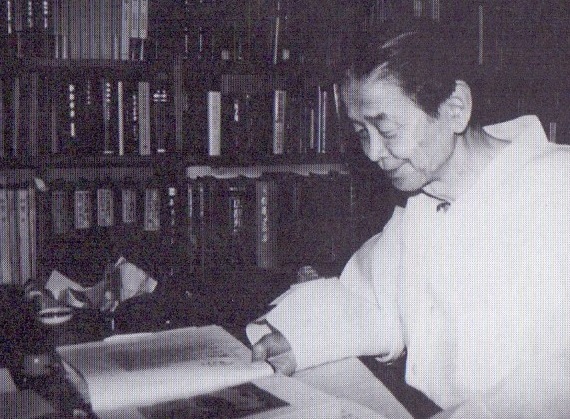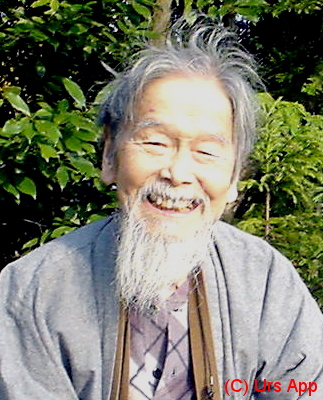ZEN MESTEREK ZEN MASTERS
« Zen főoldal
« vissza a Terebess Online nyitólapjára

柳田聖山 Yanagida Seizan (1922-2006)
![]()
柳田聖山 Yanagida Seizan (1922-2006) est un des plus importants spécialistes japonais du bouddhisme du XXe siècle. Il fait autorité dans l'étude du zen chinois (chán). En 1942, il est diplômé de l'école rinzai (l'actuelle école Hanazono). par la suite, il pratique le bouddhisme zen au Eigen-ji, temple principal de la branche Eigen-ji du rinzai. En 1948, il est diplômé de l'université Ōtani à Kyoto et tient ses premières conférences à l'université de Kyoto. En 1949, il devient assistant, puis maître de conférences en 1950, professeur adjoint en 1954 et professeur en 1960 à l'institut d'études bouddhiques de l'université Hanazono à Kyoto. Il y est nommé directeur de l'institut de littérature en 1968. En 1976, il est nommé professeur à l'Université de Kyoto.
![]()
![]()
Zum Gedenken an Prof. Yanagida Seizan
Volume in Commemoration of Prof. Yanagida Seizan.
Kyoto, Zenbunka Kenkyusho, 2008. Institute of Zen Studies, Kyoto.
https://www.mb-schiekel.de/Yanagida_memorial_ge.pdf

A short biography of Seizan Yanagida
http://www.mb-schiekel.de/Yanagida-en.htm
| 1922 | birth in the hamlet Inae in prefecture Shiga, |
| 1940 | degree from the highschool of prefecture Shiga in Hikone, |
| 1942 | degree from the Rinzai college (now Hanazono-college) in Hikone, begins rigorous Zen-training in the Rinzai-Zen monastery Eigen-ji, |
| 1948 | degree in literature at Ōtani-University, |
| 1949 | assistant for Buddhism at Hanazono-University in Kyōto, |
| 1954 | assistant-professor at Hanazono-University, |
| 1960 | habilitation at Hanazono-Universit, professor at the Institute for Buddhist-Studies at Hanazono-University, |
| 1962 | award from the Japanese Association for Indian and Buddhist Studies, |
| 1968 | head of the Institute for Literature at Hanazono-University, |
| 1976 | head of the Institute for Humanities at Hanazono-University, |
| 1981 | Yomiuri-Literature award for his book "Ikkyu - the world of Kyounshu", |
| 1986 | retirement (Prof. Emeritus), foundation of the IRIZ (International Research Institute for Zen Buddhism) at Hanazono University, |
| 1989 | donation of his private library of 14.000 books to IRIZ, USA lecture tour, |
| 1990 | inauguration of a Ryōkan-memorial bridge at Mt. Emei in the chin. province Sichuan, |
| 1991 | Korean tour on the occasion of the inauguration of Haein-sa Sangha University, |
| 1991 | Puple Ribbon Medal, |
| 1993 | donation of his private house to Hanazono University - this is renamed in Shimonkan and becomes part of IRIZ, |
| 1993 | 27. culture awards of the Buddhist Mission, |
| 1996 | retirement as direktor of IRIZ, Medal of the Holy Treasure - Isao Grade 3, |
| 2003 | visit of the Collège de France in Paris, |
| 2006 | death. |
Seizan Yanagida (聖山 柳田, 19.12.1922 - 08.09.2006) was one the most important Japanese Buddhologists in the 20.th century. He was born in a small mountain temple of the Rinzai-Zen School in the hamlet Inae near Kyōto (Japan). His major area of work was the research of Chinese Chan-Buddhism. Since the year 1960 he taught as a professor at the Institute for Buddhist Studies at Hanazono-University in Kyōto and after his retirement in 1986 he founded the IRIZ (International Research Institute for Zen Buddhism) in Kyōto, that became an important research institution for many Western Buddhologists, as well. In the course of his life Prof. Yanagida published 50 books and several hundred research papers - see the selected bibliography from Prof. Bernard Faure:
Cahiers d'Extrême-Asie, vol. 7, 1993. Numéro spécial sur le Chan/Zen : Special Issue on Chan/Zen. En l'honneur de Yanagida Seizan
Sous la direction de : Bernard Faure
Faure, Bernard
Bibliographie sélective de Yanagida Seizan
In: Cahiers d'Extrême-Asie, Vol. 7, 1993. pp. 45-50
A excellent review article about Prof. Yanagidas extensive work was published by the US Sinologist and Chan-researcher, Prof. John R. McRae:
McRae, John R.
Yanagida Seizan's Landmark Works on Chinese Ch'an
In: Cahiers d'Extrême-Asie, Vol. 7, 1993. pp. 51-103.
The Swiss Buddhologist and philosopher Prof. Urs App worked for many years as assistant, personal interpreter and vice director of the IRIZ for Prof. Yanagida. Two very impressive and very private lectures were given by Prof. Yanagida in the SFZC (San Francisco Zen Center) on the occasion of his US lecture tour in 1989. These lectures were kindly translated into English and published by Prof. App:
Seizan Yanagida, App Urs
Passion for Zen
In: Cahiers d'Extrême-Asie, Vol. 7, 1993. pp. 1-29.
The Li-Tai Fa-Pao Chi
And The Ch'an Doctrine of Sudden Awakening
by Yanagida Seizan
Translated by Carl Bielefeldt
in: Early Ch'an in China and Tibet, ed. Whalen Lai and ed. Lewis Lancaster (Berkely: Asian Humanities Press, 1983) pp. 13-49.
Record of the Dharma Treasure down through the Generations (Li-tai fa-pao chi, shortly after 775)
T2075 歴代法寶記 Lidai Fabao ji
The "Recorded Sayings" Texts of Chinese Ch'an Buddhism
by Yanagida Seizan
Translated by John R. McRae
in: Early Ch'an in China and Tibet, ed. Whalen Lai and ed. Lewis Lancaster (Berkely: Asian Humanities Press, 1983) pp. 185-205.
Yanagida Seizan's Lesson
by Bernard Faure
Zen at War
by Brian (Daizen) A. Victoria.
New York & Tokyo: Weatherhill, 1997. pp. 158-160.
Yanagida Seizan (b. 1922) started life as the son of a Rimzai
Zen priest in a small village temple in Shiga Prefecture. As an adult he became
the director of the Institute for Humanistic Studies at Kyoto University. Fol-
lowing retirement, he founded and became the first director of the Interna-
tional Research Institute for Zen Buddhism located at Hanazono University.
In 1989 he presented a series of lectures on Zen at both Stanford University
and the University of California, Berkeley.
In 1990 Seizan published a book entitled Zen from the Future (Mirai kara
no Zen). This book, containing a number of lectures he had presented in the
United States, included material that was both personal and confessional in
nature, making it relatively unusual among Zen scholarship. In the book
Seizan speaks of his experience as a young Rinzai Zen priest during and
immediately after the war:When as a child I began to become aware of what was going on
around me, the Japanese were fighting neighboring China. Then
the war expanded to the Pacific region, and finally Japan was fighting
the rest of the world. When Japan surrendered on August 15,
1945, I had experienced two major wars. As someone who was
brought up while these wars were expanding, I did not have the
luxury of thinking deeply about the relationship between the state
as a sovereign power engaged in war and Zen Buddhism. No doubt
this was largely due to the fact that I had neither the opportunity
to go to the battlefield nor directly engage in battle. Furthermore,
having been brought up in a remote Zen temple, I was completely
ignorant of what was happening in the world. In the last phase of
World War II, I was training as a Zen monk at Eigenji, proud of
being away from the secular world and convinced that my total
devotion to Zen practice would serve the state.
At any rate, with Japan's defeat I became aware of my own stupidity
for the first time, with the result that I developed a deep
sense of self-loathing. From 1945 to 1950 I did not see any point to
human life, and I was both mentally and physically in a state of collapse.
I had lost many of my friends; I alone had been left behind.
We had fought continuously against China, the home country of
Zen. We had believed, without harboring the slightest doubt, that
it was a just war. In a state of inexpressible remorse, I could find
rest neither physically nor mentally, and day after day I was deeply
disturbed, not knowing what to do.
There is no need to say how complete is the contradiction between
the Buddhist precepts and war. Yet, what could I, as a Buddhist,
do for the millions upon millions of my fellow human beings who
had lost their lives in the war? At that time, it dawned on me for the
first time that I had believed that to kill oneself on the state's behalf
is the teaching of Zen. What a fanatical idea!
All of Japan's Buddhist sects--which had not only contributed
to the war effort but had been one heart and soul in propagating the
war in their teachings--flipped around as smoothly as one turns
one's hand and proceeded to ring the bells of peace. The leaders of
Japan's Buddhist sects had been among the leaders of the country
who had egged us on by uttering big words about the righteousness
[of the war]. Now, however, these same leaders acted shamelessly,
thinking nothing of it. Since Japan had turned itself into a civilized
[i.e., democratic] nation overnight, their actions may have been un-
avoidable. Still, I found it increasingly difficult to find peace within
myself. I am not talking about what others should or should not
have done. My own actions had been unpardonable, and I repeatedly
thought of committing suicide.Seizan did not, of course, commit suicide, but it is bracing to meet a
Japanese Buddhist who was so moved by his earlier support for the war that
he entertained the idea of killing himself. The irony is that by comparison
with the numerous Zen and other Buddhist leaders we have heard from so
far, Seizan bore very little responsibility for what had happened. Yet in the
idealism of youth he felt obliged to take the sins of his elders on his own
shoulders. He neither sought to ignore what had happened nor place the
blame on anyone else.
Seizan's disdain for the way in which the previously prowar leaders of
the various sects had so abruptly abandoned their war cries and become
"peacemakers;" coupled with his overall dissatisfaction with Rinzai Zen war
collaboration, led him to stop wearing his robes in 1955:I recognized that the Rinzai sect lacked the ability to accept its [war]
responsibility. There was no hope that the sect could in any meaningful
way repent of its war cooperation ... Therefore, instead of
demanding the Rinzai sect do something it couldn't do, I decided
that I should stop being a priest and leave the sect ... As far as
I'm concerned, [Zen] robes are a symbol of war responsibility.
It was those robes that affirmed the war. I never intend to wear
them again.Seizan's return to lay life did not, however, signal a lessening of his interest
in Zen, for he became one of Japan's preeminent contemporary scholars of
Buddhism, earning an international reputation for his research into the
early development of Chinese Zen, or Chan Buddhism.